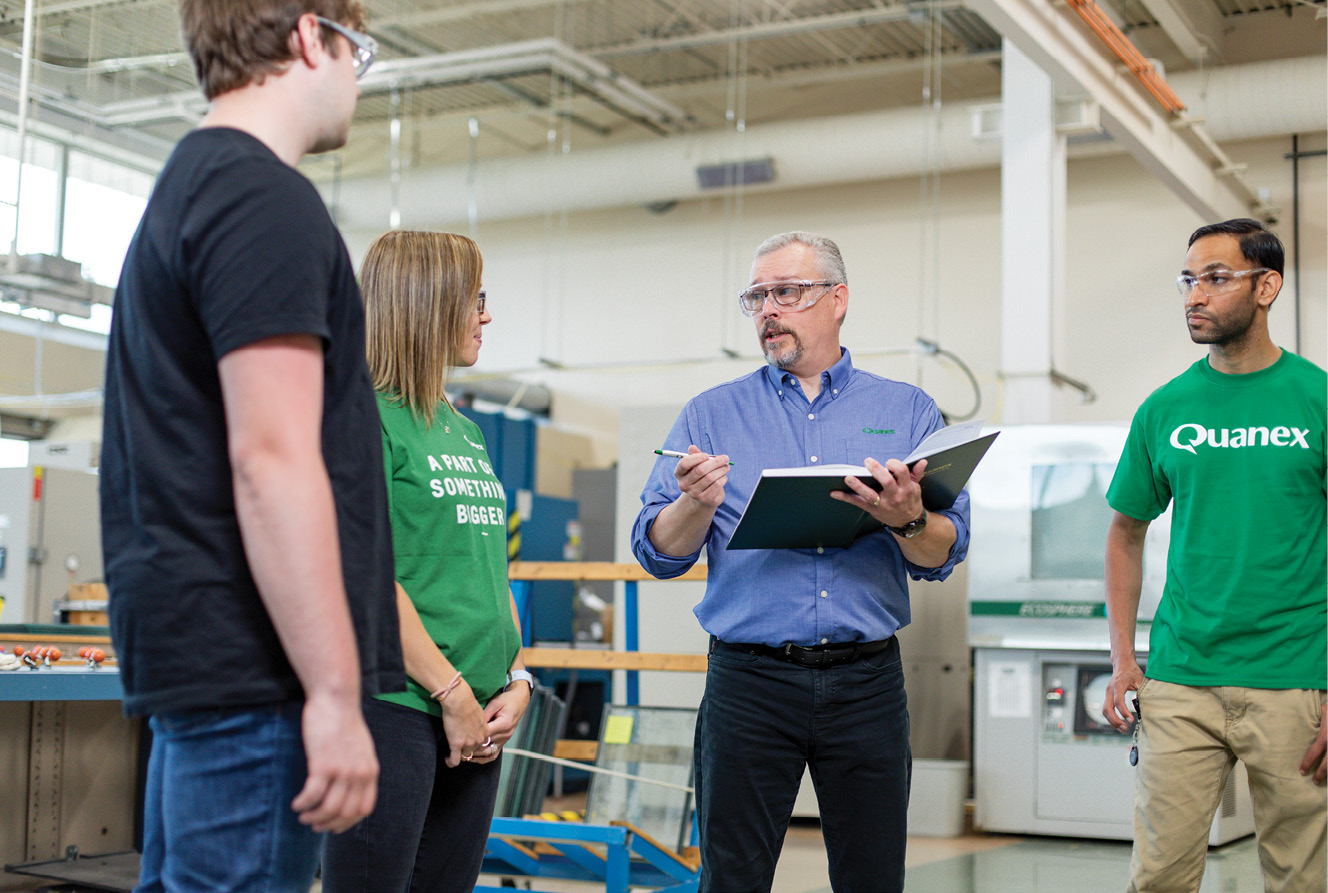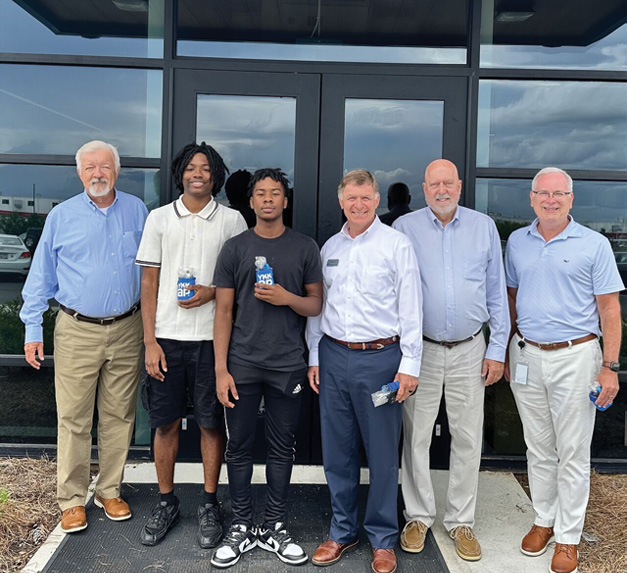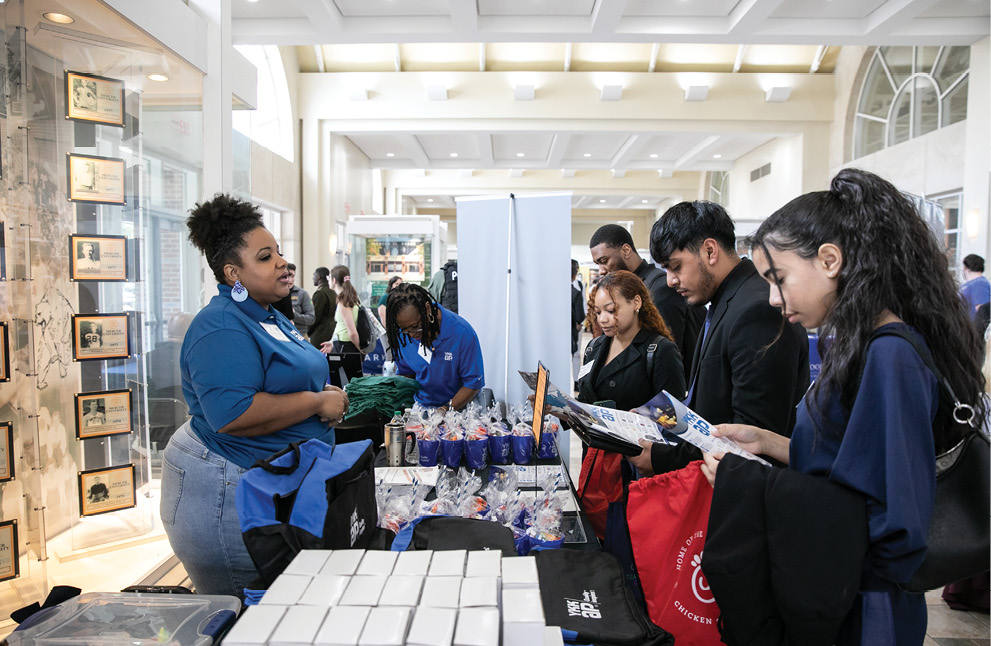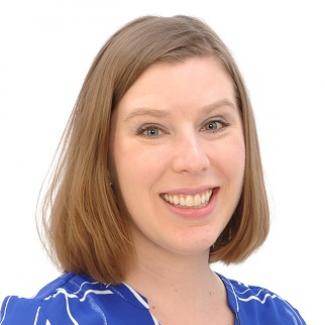A Window Into Higher Ed
Industry companies establish relationships with higher education at the local, national and global levels to advance the industry

Above: Sean Hummel (center) works with student interns at Quanex.
The building products space is ripe with opportunities for innovation in materials, products and manufacturing. A swell in companies involved with universities to further research and development further bolsters the fenestration’s commitment to future- and forward-thinking solutions.
YKK AP America is one such company developing relationships with universities at the local, national and even global level. “Like many in our industry, we are finding universities and schools are great sources of not only talent but also solutions to business problems,” says Ray Shelton, vice president of sustainability and communications, YKK AP America.
Local benefits

One of YKK AP’s relationships is with Mercer University near Macon, Georgia, where YKK AP recently opened its $125 million residential manufacturing facility. YKK AP America signed on as the inaugural gold member of the Mercer Corporate Partners Program with an annual gift commitment to support the Stetson-Hatcher School of Business, the School of Engineering, and the Center for Career and Professional Development, according to a release on Mercer’s site.
As part of this, YKK AP will gain the highest level of access to Mercer career events, membership in the university’s Enterprise Learning Partnership program and other special student/faculty access with the business and engineering schools.
Shelton says the opportunity with Mercer aligned perfectly with the company’s investment in its Macon manufacturing plant and signals the company’s ongoing commitment in the middle Georgia area. The benefits are two-fold. First, he says, is the benefit to Mercer of developing relationships with employers and areas of study within the university.
“Providing our business and engineering students special access to these corporate partners means they will be exposed to the latest in manufacturing technologies and business practices,” says Dr. Julie Petherbridge, dean of the Stetson-Hatcher School of Business. “We cannot think of a better way to prepare them for the world of work and their future endeavors.”
Secondly, YKK AP employs engineers. Shelton notes it can be difficult to hire enough skilled employees, particularly in the middle Georgia region.
“We really want to make sure we’re tapping into a pipeline of talent early and the developers of those talent—colleges and universities,” Shelton says. “Mercer and other universities are interested in understanding what our need is both from a people perspective and a business perspective. We want to understand how we can mutually develop programs to solve our needs.” Shelton continues that the YKK AP is interested in developing internship and mentorship programs.
At the enterprise executive team level, Shelton hopes this relationship with Mercer will serve as a good model for partnerships with other educational institutions. Already, YKK AP has other targeted relationships, including one with Middle Georgia State University where they tackle specific skills management gaps. If current and future employees don’t have a good skills match for a particular plant or line, then YKK AP aims to have a developmental program in place to nurture the needed skills. Shelton explains a company needs to take inventory of what gaps exist and how to fill them as a part of the developmental process to know what skills to focus on.

A reciprocal relationship
Quanex connected with the University of Akron in 2018 to start an internship program for the dual benefits of being part of the community and developing a wider talent base in its core competencies. Mechanical and chemical engineering were Sean Hummel’s, Quanex’s director of research and development, first two interests; the scope of the relationship spread from there. “We connected with a few of the professors, and it made sense to start working with them,” he explains. “They have a lot of equipment and instruments we don’t have, and vice versa. Currently, we have two projects with the University of Akron that are very forward-looking, very material science related. Exploration, if you will.”
On the marketing side, Cristina Murray, director of marketing, Quanex, attended a luncheon where Quanex CEO George Wilson received an award, which led to discussions between Murray, the business school dean, the marketing department chair and more. The school ultimately asked Murray to give a presentation about B2B marketing, which many students are unaware is an option.
Manufacturing opportunities abound in Akron’s Rust Belt location. “I want to really make [the students] think differently about manufacturing,” Murray says. They ultimately did a Project Runway-type challenge in the classroom where students learned about Quanex and then presented solutions to real-world challenges. The final three teams presented to George Wilson, CEO; Kim Garcia, director of global HR; and Murray’s team. “It was an awesome experience for them,” says Murray. “They really had to apply everything they learned about the company and give us suggestions for recruiting the future. It was also great for us to know what was top of mind for students.”
It’s a two-way street. Not only do the students learn from the professionals at Quanex, but Quanex learns from the students and has gained solid interns. “We have to work as a united front within this industry to really help them see the wonderful possibilities that are out there for them,” Murray explains.
“A large piece of this is getting with the universities to educate them on who we are,” says Hummel. “It’s neat to help them get excited. Every one of the projects with the university have at least one student researcher on it; they’re the ones primarily doing the work. It’s so cool to see how young kids think these days. It’s very creative.”
Hummel notes the importance of pairing students’ intellect and creative thinking with manufacturing’s modern hurdles. “That marriage winds up being pretty important,” he says. Creativity lies in problem-solving. The rules of chemistry still apply with polymer science and engineering, but how to get from point A to point B can differ. Hummel likens it to mixing a cake. The ingredients remain static, but the order in which the ingredients are added, and the method in which they’re mixed can drastically alter the outcome. “There are rules of play,” he says, “but not one way to do it right. You look at the freedom of understanding cause and effect, then push the boundaries of how you get there.”
Hummel views it as his job to show an intern what the industry is about. “I was asked once what I require from an intern,” he recalls. “The answer is ‘nothing.’ I went into it wanting to give something. I view it as my job to show them what the industry is about. They come here and have projects to work on and fail if need be. But we guide them, they make all the decisions, and they get to do it. We’re looking for free thinkers.” And the stats speak for themselves: all three of Hummel’s interns returned to work for the company.
Global Perspective
Partnering with local higher education has obvious and targeted benefits, but local institutions aren’t the only options. Earlier this year, YKK AP Inc. announced its support for a Harvard University Graduate School of Design research program in Kurobe City, Toyama Prefecture, and Kyoto City, Kyoto Prefecture, Japan. The initiative aims to explore design solutions and foster cross-cultural exchange in landscape architecture, urban planning and design, and environmental sustainability. Two research periods will focus on “Resilient Design in Local Cities” and “Advanced Landscape Architecture Measures for Environmental Issues.”
YKK AP aims to contribute to advancing sustainable urban development practices while fostering meaningful connections between academia, industry and local communities, according to a news release. Employees will gain exposure to cutting-edge research, interdisciplinary collaboration and real-world challenges that ultimately will enhance the company’s internal capacity to innovate, problem-solve and develop practical applications of sustainable design principles in the built environment.
Shelton notes the research locations in Japan, where YKK AP’s headquarters are, and the U.S.-based Harvard allow the company to tap into different pieces of the global enterprise. “We are very much a U.S. business with YKK AP America, but we have the benefit of being tapped into the global enterprise, which has that deep set of roots in terms of design and an organizational size and structure that allows for this level of investment and commitment to a multi-year program,” says Shelton.
Shelton says the company’s founding principles are sustainability themed and what they call the “cycle of goodness,” or “the idea of always giving back into society, the environment or nature. No one benefits without rendering benefits to others.”
Research and technology
In yet another university relationship, YKK AP Technologies Lab opened its 7,576-square-foot research and development center in July in Pittsburgh in partnership with Carnegie Mellon University. YKK AP and CMU have partnered since 2020.
The lab will focus on R&D around new and emerging technologies, as well as the digital transformation of YKK AP Inc.’s business and construction in general. The company intends for a “virtual factory” to create enhanced efficiencies in the production and installation of YKK AP’s windows and doors, as well as improve logistics and global management systems.
During the lab’s grand opening, CMU students and YKK AP hosted a dynamic demonstration showcasing how advanced robotics can automate installation of core components of a building. “Our goal as an organization is to improve construction productivity and quality through the research and development of virtual reality, augmented reality and mixed-reality technologies,” says Fukada Shiori, chief digital officer, YKK AP Technologies Lab (NA) Inc., in a news release.
“The entity is really a laboratory for study,” explains Shelton. “The goal is very much technology, research and development oriented. A big goal was to place it in a location that would foster really great relationships with research; CMU is a preeminent institution in that space.”
Because it’s such a new entity, Shelton says there is a lot of flexibility for its future. “They went into it with a wide-open mandate with what it can be,” he explains. Efforts right now revolve around maximizing how to partner with CMU and leverage research opportunities.
Beyond partnerships
Opportunities abound beyond official partnerships. Design challenges, such as those through organizations like SkillsUSA, provide opportunity for involvement. Companies can also offer themselves as subject matter experts, judges or mentors for schools.
Shelton also speaks to the ability to provide opportunities for underrepresented communities in the architecture, engineering and design space. “Leadership roles in the communities in which we operate are very important in terms of our guiding principles and philosophy,” he says. “Give underserved communities and youth a view of areas they may not have known were opportunities to explore. We see it as our responsibility to provide those opportunities and shine a light.”
